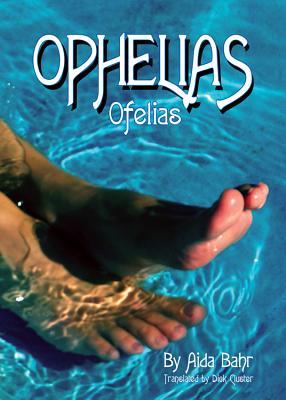Madness comes in many forms.
Ophelias, Aida Bahr’s latest story collection, tactfully touches upon many of them, exploring the mysterious forces that can bring even the strongest human spirit to its knees. Like the book’s muse, the women at the center of Bahr’s tales reach their breaking point and fall into a darkness from which they cannot return.
United in their ambiguity and theme, the eight stories in Ophelias approach the concept of insanity from various points of view and provide brief, poignant glimpses into lives no longer governed by reason. Through a woman waking up in terror of the strange man sleeping in her bed in “Early Morning” and a desperate young mother who has lost control of her child and her memory in “Uncertainties,” Bahr explores the inner workings of minds unhinged by troubling circumstances. Unable to cope with the realities of their existence, the heroines of Ophelias blindly seek relief, answers, and healing where none can be found and ultimately suffer for it. Imagination overwhelms logic in “The Tiger’s Eyes” as a college professor finds herself trapped in a walking nightmare of her own creation and a teenager in “Sail Away” throws herself into an unstable dream world of alcohol, drugs, and sex that threatens to overwhelm her. Bahr’s collection also investigates the kinds of secrets that can corrode a person’s sanity and happiness in “Women’s Games” as a wife deals with her own forbidden desires and in “Doors” as a widow copes with the lingering presence of her late husband and the details of his life that were kept from her. Long-held grudges and buried hatred cause madness to spread through generations in “Getaways” as a young girl’s visit with her great-grandmother causes further devastation in a broken family and a daughter turns on her own father when his prejudices drive them both to violence in “Colors.”
Cuba serves as the backdrop for each tale, but Bahr’s use of the Cuban countryside and smaller cities brings the reader into a human landscape far more familiar than the squalid streets and glamorous clubs of Havana. Her women lead lives not so very different from our own, despite the flashes of cultural color that naturally emerge in a recounting of their daily routines, and that is what makes their experiences all the more frightening. Bahr’s writing style evolves with each piece, fluctuating between a matter-of-fact narrator witnessing another’s trials and tribulations and a passionate, meandering prose that follows the lucidity and lunacy of a character’s thoughts. Dick Cluster’s English translation successfully preserves the vagueness and poetic language that the Spanish originals intended.
Through her re-imagined Ophelias, Bahr’s work questions the origins of madness itself. Is it our fears – of failure, of death, of loneliness – that cause irreparable confusion and utter denial of truth? Is it the agony that follows a traumatic experience and our own inability to deal with the aftermath? Or is it something inherent within us, from the very moment of our birth, which requires only an instant – the hand of fate itself – to pull the trigger and set into motion? Bahr’s stories paint the downward spiral to self-destruction with subtle strokes; she suggests the path that each woman has traveled without clearly marking the way or showing the final act of their tragedy.
While readers may experience some confusion at the close of one of Bahr’s tales, I at least was left the impression that such confusion forges a stronger connection between the reader and the madwomen of her stories. After all, Ophelia told Hamlet that she was the “more deceived” by the workings of her heart and mind; the women of Bahr’s stories find themselves repeating her tragedy and are therefore rightly beyond our full comprehension even as they receive our compassion and engage our interest. The last stages of their downfall are richly captured and make Ophelias an intriguing read.
Ophelias is now available through Cubanabooks and Amazon. See their website for more information.


